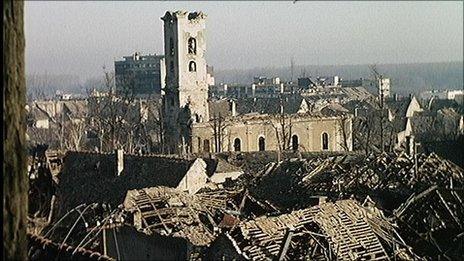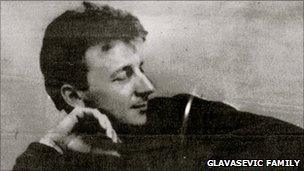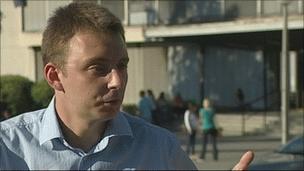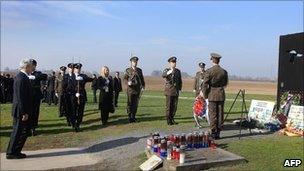Croatia Vukovar war: Overcoming a legacy of war
- Published

Vukovar town, following heavy shelling during the war of independence, 1991
Croatia's progress to the European mainstream has been long and difficult, for the country has had to turn the page on some of the darkest episodes in European history since World War II.
I covered Croatia's independence war in 1991 and now I have gone back to Vukovar.
It is again a pretty town on the broad sweep of the Danube River.
One day soon, this could be the EU's eastern edge.
Much the town's former beauty has been restored.
Young lovers stroll along sunlit riverbanks while people relax and chat amiably in shady pavement cafes.
But Vukovar is haunted by its recent history.
Ghettos
Three months of siege and bombardment by Serb forces in 1991 all but reduced the town to rubble - and destroyed a once happy, common life lived by Serbs, Croats and more than 20 other registered national minorities alike.

Croatian radio reporter Sinisa Glavasevic, shot by Serb paramilitaries, 1991
Today the ethnic groups walk the same streets but they do so separately.
"Young Serbs and Croats live in separate ghettos," Srdjan Antic told me.
He runs a Norwegian-funded NGO that tries to promote reconciliation and a common life between the ethnic groups.
"We have some neutral cafes, but mostly everyone knows which cafe is Serb and which is Croat, which sports clubs are Serb and which Croat," he says.
"Even the amateur fishing clubs are divided."
Twenty years ago, I reported the fall of Vukovar from outside the siege lines.
I used to listen on my car radio to the voice of a Croatian Radio reporter called Sinisa Glavasevic.
He was my age. I found his reporting compelling, vivid, brave.
By the end of the siege we knew that he was hated by the Serb paramilitaries.
We also knew that if they caught him, there was a strong chance that they would kill him.
Taken away
Vesna Bosanac, then the director of Vukovar's hospital, knew him.
"He was a wonderful young guy," she told me. "He was a poet. He was full of love for this town - and all its people.
"His reports were very emotional but he was a happy person and always very amusing.
"He came to the hospital every day to find out what was happening.
"I saw him at the end, wandering in the corridors. He was hoping to get out on a Red Cross convoy."
From the neighbouring town of Vinkovci I reported the progress of that convoy - or, rather, the lack of it.
It was denied access to Vukovar by the forces who had overrun the town.
We did not know that they were rounding up hundreds of people - among them Sinisa Glavasevic - and taking them away.
They killed him.
He was taken to a farm at Ovcara about 11km form Vukovar, beaten and then shot.
He was buried in a mass grave with nearly two hundred others. It is now a memorial site.
Refusal to demonise
Sinisa Glavasevic had a son, who was then seven years old. Bojan Glavasevic is now a young linguistics lecturer at Zagreb University.

Bojan Glavasevic: "Not all Serbs are killers; you have to deconstruct the mythology."
"My father was a very jovial man," he told me.
"He knew how to amuse people. People liked him. If you'd met him in a bar you'd have wanted to spend the whole evening with him."
I asked him about the men who killed his father.
"I could have taken a very radical attitude to people from Serbia, for example," he said.
"I chose not to because you cannot generalise. You cannot take the actions of a few people and demonise an entire nation. Sure you can say 'all Serbs are killers'. But they are not.
"You have to deconstruct the mythology that is served up to us by people who need our votes - by people who need us to hate in order to get our votes.
"We cannot live our own lives if we are constantly dragged back to the past."
In a country where nationalist sentiment is still strong, this is a dissenting sentiment.
It is the expression of a civic, rather than an ethnic, Croatian identity.
But it reflects what has happened in Croatia in the 20 years since the conflict Croats call the Homeland War.
In the early 1990s the mood here was overwhelmingly nationalistic, even xenophobic in sentiment.
But in 1997, the region of Eastern Slavonia was peacefully reintegrated in the Republic.
Echoing voice

Serbian President Boris Tadic pays tribute at the Ovcara memorial to Croats killed by Serb forces
Many Serbs who had opposed - indeed fought against - Croatian independence, came back to live here.
In 2003, hardline nationalist parties lost their supremacy and Serb political parties joined the governing coalition for the first time.
Milorad Pupovac leads the Serbian National Council, and heads a Serb political party that is in government in Croatia.
"It is a process," he said.
"Our duty is to bring people together, to free people from fears real and historical. There are still real fears but we are now on a road that cannot be reversed, restoring inter-ethnic relations."
According to Bojan Glavasevic: "Young people need to experience and fell the sadness of what happened, but not the hatreds, not the aggression.
"And they need to know that not only Croatian people were killed at Vukovar. A lot of Serbs died there."
It is, he says, a view that is consistent with his father's love of pre-war Vukovar, which was home to Serbs as well as Croats.
It is also a tribute from a son to a lost father - and a young man whose own voice resonated so powerfully 20 years ago.